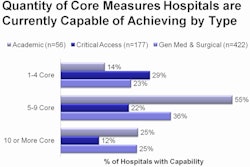Sunday, November 28 | 11:05 a.m.-11:15 a.m. | SSA11-03 | Room S403A
The value of using a computerized clinical decision-support system when ordering a CT pulmonary angiogram (CTPA) for suspected pulmonary embolism (PE) will be one of several scientific session presentations on the use of clinical decision support by physicians.In January 2009, St. James Hospital, the largest teaching hospital in Dublin, Ireland, implemented CTPA Advisor (Cerner, Kansas City, MO) and integrated the software program with its electronic patient record and PACS. The radiology department conducted two audits of the software's impact, consisting of a retrospective audit of CTPA scans ordered before the software was installed and the subsequent patient outcomes, as well as a prospective audit throughout calendar year 2009.
Gillian Murphy, MD, who was a radiology specialist registrar at St. James Hospital during these years, will present the findings of the audits and discuss the impact of this clinical decision-support system.
The CTPA Advisor works by requiring ordering physicians to input relevant patient clinical details. It uses this information to stratify patients into low- or high-risk categories of developing a pulmonary embolism. This clinical decision-support system recommends if a D-dimer test is needed, and whether the CTPA exam should be ordered.
In 2008, 659 patients underwent a CTPA scan. Approximately 11% of these patients were diagnosed with a pulmonary embolism. All of the patients who had normal results from their D-dimer tests also had negative CTPA scan results. The audit revealed that clinicians were inappropriately ordering this exam.
In 2009, 835 CTPA studies were ordered, but 35% of them were subsequently canceled. Seventeen percent of the patients who did have the exam, a total of 546 patients, were diagnosed with a pulmonary embolism, an increase of 6% from the prior year. And the actual number of exams performed decreased by 113, or 14%.



















